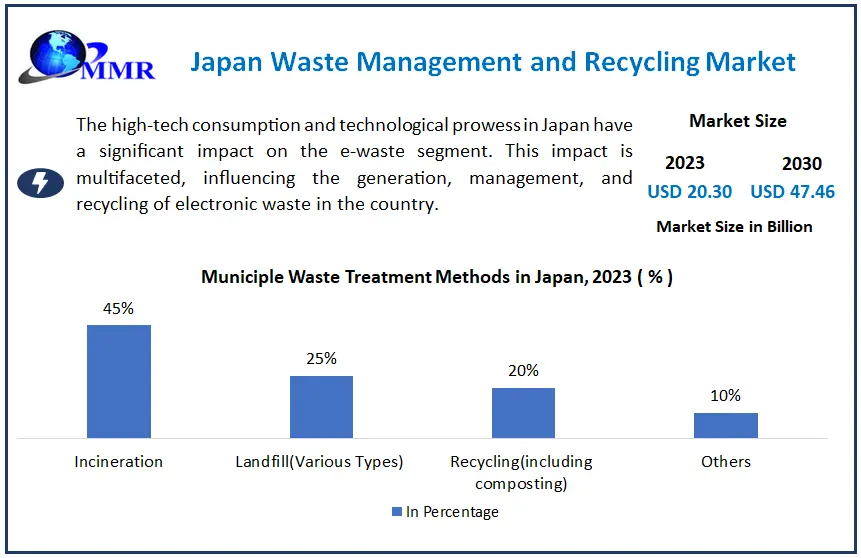Introduction
Japan is known for its efficiency, innovation, and commitment to sustainability. With a rapidly aging population, limited land resources, and a strong focus on environmental preservation, Japan has developed one of the world’s most advanced waste management and recycling systems. The country boasts a waste recycling rate of over 80%, making it a global leader in sustainable waste management.
With growing concerns over plastic pollution, electronic waste, and industrial waste disposal, Japan’s waste management and recycling market is poised for significant transformation. This blog explores key trends, challenges, and opportunities shaping the future of waste management in Japan.
Japan’s Waste Management Market: An Overview
The waste management and recycling market in Japan is structured, efficient, and backed by strong governmental policies. The country follows a strict waste segregation system, ensuring minimal landfill waste and maximum recycling.
Key Statistics and Market Insights
✅ Japan generates approximately 42 million tons of municipal waste annually.
✅ Over 80% of waste is either recycled, composted, or incinerated.
✅ The plastic recycling rate stands at 84%, one of the highest globally.
✅ Japan’s waste-to-energy (WTE) technology is widely adopted, with over 1,200 incineration plants operating across the country.
✅ The market is expected to grow at a CAGR of 5.2% from 2024 to 2030, driven by increasing environmental regulations and technological advancements.
Curious about the market dynamics? Get a free sample to explore the latest insights here:https://www.maximizemarketresearch.com/request-sample/222538/
Frequently Asked Questions (FAQs) About Japan’s Waste Management Market
1. How Does Japan’s Waste Segregation System Work?
Japan has one of the most detailed waste classification systems in the world. Citizens are required to separate waste into categories such as:
🔹 Burnable Waste (燃えるゴミ) – Includes food waste, paper, and cloth.
🔹 Non-Burnable Waste (燃えないゴミ) – Includes metals, ceramics, and glass.
🔹 Plastic Waste (プラスチックゴミ) – Includes plastic bottles, packaging, and containers.
🔹 Cans & Bottles (缶・瓶・ペットボトル) – Includes aluminum cans, glass bottles, and PET bottles.
🔹 Large Waste (粗大ゴミ) – Includes furniture, electronics, and large appliances.
Failure to adhere to these regulations can result in fines or waste collection refusal.
2. What Are the Biggest Challenges in Japan’s Waste Management Market?
Despite being a leader in recycling, Japan faces several challenges, including:
🚧 Limited Land for Landfills – Japan’s geographic constraints make landfill waste disposal highly restrictive.
🚧 Rising Plastic Waste – Despite high recycling rates, Japan remains one of the largest plastic waste generators per capita.
🚧 Aging Population – A declining workforce impacts labor availability for waste collection and recycling.
🚧 High Incineration Costs – Waste-to-energy incineration is expensive and requires constant technological upgrades.
3. What Role Does Waste-to-Energy (WTE) Play in Japan?
Japan heavily relies on waste-to-energy incineration to manage its waste. Nearly 70% of Japan’s waste is incinerated, which helps reduce landfill dependency and generates electricity. However, critics argue that incineration contributes to air pollution and carbon emissions.
To address this, Japan is investing in advanced filtration systems and carbon capture technologies to minimize environmental impact.
4. How Is Japan Tackling Plastic Waste?
Japan has implemented strict plastic reduction policies, including:
🔹 Banning free plastic bags in retail stores (since 2020).
🔹 Encouraging businesses to use biodegradable plastics.
🔹 Investing in advanced plastic recycling technologies.
🔹 Promoting reusable packaging initiatives in the food and beverage sector.
5. What Are the Growth Opportunities in Japan’s Recycling Market?
As Japan strengthens its waste management system, new business opportunities are emerging in areas such as:
🔹 Smart Waste Management – AI-driven sorting systems and IoT-enabled waste tracking.
🔹 Recycled Material Market – Growing demand for recycled plastics, metals, and e-waste components.
🔹 Organic Waste Management – Expanding composting and biogas production.
🔹 Circular Economy Initiatives – Encouraging companies to develop closed-loop production cycles.
To Gain More Insights into the Market Analysis, Browse Summary of the Research Report:https://www.maximizemarketresearch.com/market-report/japan-waste-management-and-recycling-market/222538/
Government Policies and Regulations
Japan’s Ministry of the Environment enforces strict regulations to promote sustainable waste management. Some key laws include:
📜 The Basic Act for Establishing a Sound Material-Cycle Society (2000): Promotes recycling and waste reduction.
📜 The Waste Management and Public Cleansing Act: Regulates industrial and hazardous waste disposal.
📜 The Containers and Packaging Recycling Act: Mandates businesses to take responsibility for packaging waste.
📜 The Act on Promotion of Resource Circulation for Plastics (2022): Strengthens plastic recycling and reduction measures.
These policies drive Japan’s commitment to zero waste and a circular economy.
Emerging Trends in Japan’s Waste Management Market
🚀 1. Smart Waste Collection Systems – AI-powered waste bins and automated sorting technologies enhance efficiency.
🚀 2. Expansion of Circular Economy Models – Businesses are designing waste-free production cycles to reduce resource consumption.
🚀 3. Increase in Urban Mining Projects – Companies are extracting valuable metals from e-waste, reducing dependence on imported raw materials.
🚀 4. Investment in Biodegradable Alternatives – Japan is pushing for biodegradable plastics and plant-based materials to curb pollution.
🚀 5. Technological Innovation in Recycling – Advanced mechanical and chemical recycling processes are increasing plastic reuse efficiency.
Conclusion
Japan’s waste management and recycling market stands as a global benchmark for efficiency and innovation. With strict regulations, advanced technology, and strong public participation, Japan has successfully minimized landfill dependency and maximized recycling rates.
However, rising plastic waste, aging demographics, and high incineration costs pose challenges for the future. The adoption of smart waste management solutions, investment in sustainable materials, and strengthening circular economy initiatives will play a crucial role in shaping Japan’s waste management landscape in the coming years.
For businesses and investors, the Japan waste management market presents lucrative opportunities in recycling technologies, waste-to-energy projects, and sustainable material innovation. As environmental concerns continue to grow, Japan’s proactive approach to waste management offers valuable insights for the rest of the world.


